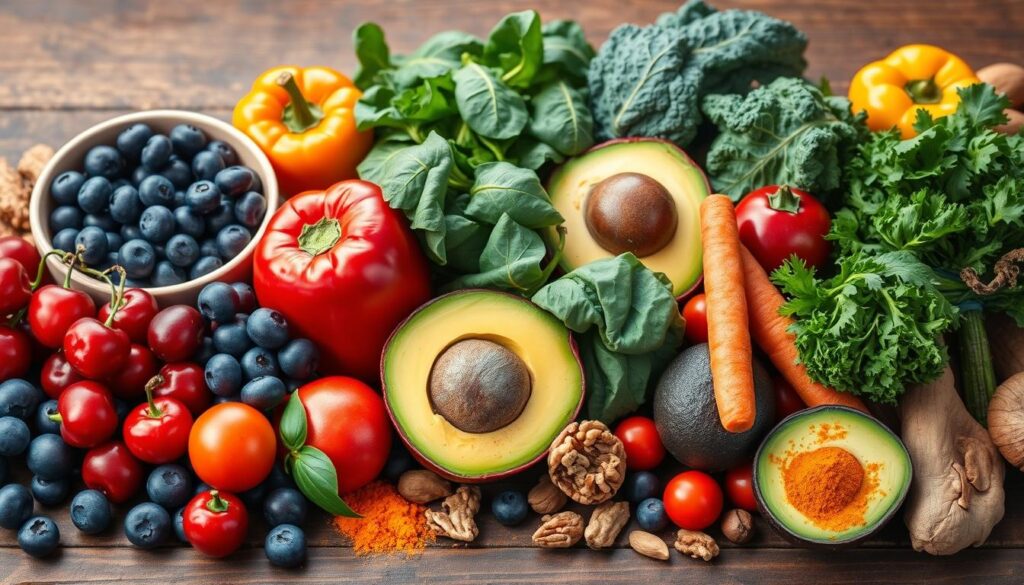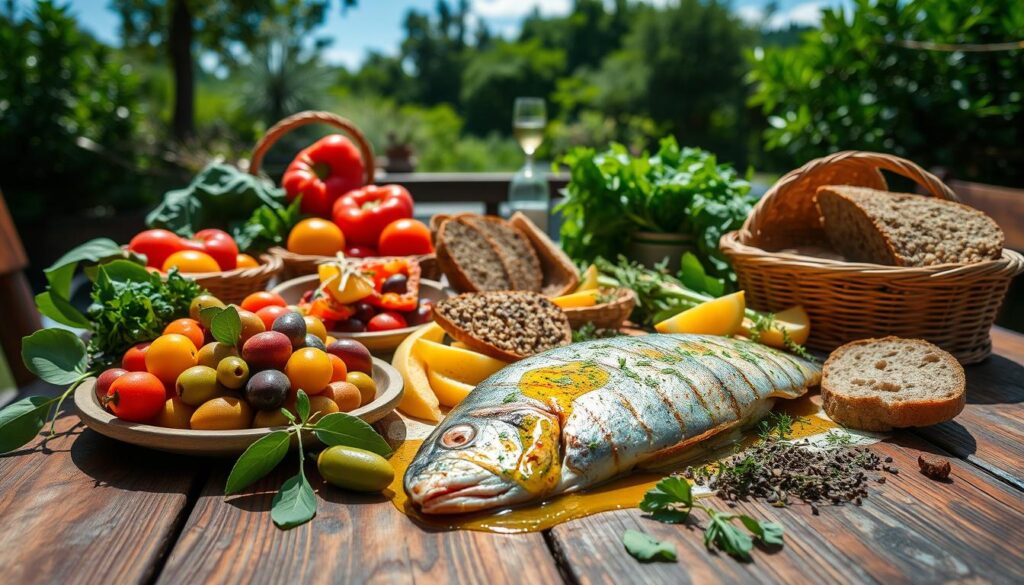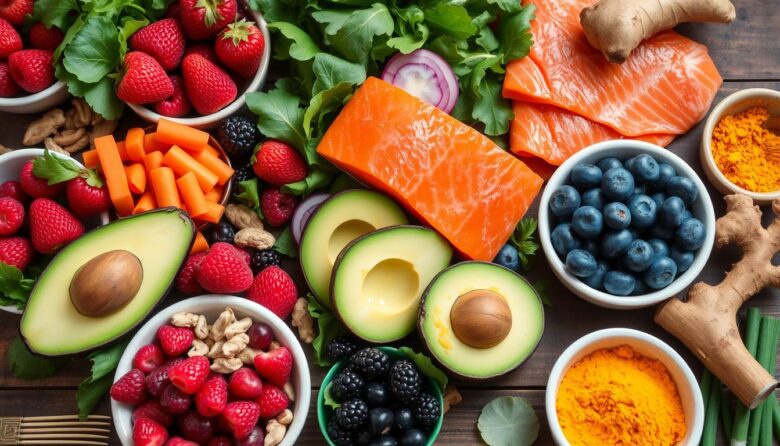As men get older, it’s key to manage chronic inflammation for their health. Inflammation is a natural response, but it can lead to problems like joint pain and heart disease. Eating the right foods can help men over 40 reduce inflammation and feel better.
Men can fight inflammation by eating foods like berries, fatty fish, and veggies. This article will show you the best foods to eat to stay healthy and look younger. By choosing the right foods, men can keep inflammation at bay and look younger.
Eating anti-inflammatory foods can make a big difference for men over 40. They can feel less pain in their joints and have a healthier heart. This article is your guide to the best foods to fight inflammation and stay well in your middle years.
Understanding Inflammation and Its Impact on Men’s Health After 40
Inflammation is a natural body response to injury or infection. But, chronic inflammation can harm men’s health, especially as they get older. For men over 40, stress, sedentary lifestyles, and poor dietary choices can increase inflammation. It’s key to know the causes and signs of chronic inflammation to stay healthy later in life.
What Causes Inflammation in Aging Men
Men over 40 often face more oxidative stress and hormonal changes. These can make inflammation worse. Conditions like metabolic syndrome and arthritis prevention are vital for men over 40, as they’re linked to chronic inflammation.
Signs of Chronic Inflammation
- Joint pain and stiffness
- Persistent fatigue and lack of energy
- Digestive issues, such as bloating or constipation
- Increased susceptibility to heart disease and other chronic conditions
Why Managing Inflammation Becomes Critical After 40
Uncontrolled inflammation can lead to many health issues. This includes metabolic syndrome, heart disease, and some cancers. As men age, managing inflammation is crucial to avoid these problems and keep well-being.
Essential Anti-Inflammatory Foods for Optimal Health
As men get older, fighting inflammation is key for staying healthy. Luckily, there are many foods that can help. These foods can reduce chronic inflammation and boost wellness. Let’s look at some of the best foods to add to your meals.
Berries like blueberries, raspberries, and strawberries are full of antioxidants. They help lower inflammation in the body. Studies show that berries effectively reduce inflammation and stop proinflammatory actions in the body.
Fatty fish, like salmon and sardines, are packed with omega-3 fatty acids. These acids have strong anti-inflammatory effects. It’s recommended to eat at least 3 to 4 ounces of fish rich in omega-3s, twice a week.
Cruciferous veggies, such as broccoli and Brussels sprouts, are full of antioxidants and polyphenols. These help lower inflammation. Eating lots of these veggies is important for staying healthy.
Healthy fats, like those in avocados and olive oil, also help reduce inflammation. Olive oil is linked to lower rates of inflammatory diseases. It reduces inflammatory markers like CRP. It’s suggested to have two to three tablespoons of olive oil daily.
Other foods that fight inflammation include green tea, turmeric, and dark chocolate. Dark chocolate can lower inflammatory markers like IL-6 and hs-CRP.

Adding these omega-3 fatty acids, antioxidants, and polyphenols-rich foods to your diet can fight inflammation. This helps keep you healthy and well as you age. A balanced diet is essential for staying well.
The Power of Mediterranean-Style Eating Patterns
The Mediterranean diet is known for its anti-inflammatory benefits. It’s based on the traditional foods of countries near the Mediterranean Sea. It focuses on plant-based foods, whole grains, and healthy fats for better health.
Key Components of the Mediterranean Diet
The Mediterranean diet is full of plant-based foods. It includes fruits, vegetables, whole grains, legumes, nuts, and seeds. These foods are packed with vitamins, minerals, and antioxidants. They also have a lot of dietary fiber, which helps keep the gut healthy and fights inflammation.
This diet also includes healthy fats like olive oil, avocados, and fatty fish like salmon, mackerel, and sardines. These fats are good for the heart and can lower the risk of chronic diseases.
Transitioning to Anti-Inflammatory Eating
Switching to an anti-inflammatory diet like the Mediterranean diet is easy. Start by adding more plant-based foods to your meals. Try adding more vegetables or using whole grains instead of refined ones. Also, use extra virgin olive oil or avocado oil for cooking and dressings.
Meal Timing and Portion Control
Keeping a regular meal schedule and watching portion sizes is important. Eat smaller, more frequent meals to stay full and energized. This helps your body fight inflammation better.

Foods to Avoid for Reducing Inflammation
It’s important to focus on anti-inflammatory foods but also limit pro-inflammatory ones. These include processed meats, refined carbs, and foods with lots of added sugars and unhealthy fats. Eating these foods can make inflammation worse and lead to health problems.
Processed meats like bacon, sausage, and deli meats have saturated fats and preservatives. These can start an inflammatory reaction in your body. Refined carbohydrates, such as white bread, pasta, and pastries, also cause inflammation. This is because they have a lot of added sugar and not much fiber.
Foods with added sugars are bad because they raise blood sugar and insulin levels. This fuels inflammation. Fried and heavily processed foods, and those with trans fats, should also be cut down. They can lead to long-term inflammation.
Changing your diet is just one part of managing inflammation. Drinking less alcohol and avoiding trans fats are also key. Making these changes can help reduce inflammation and improve your health.
| Inflammatory Foods to Avoid | Healthier Alternatives |
|---|---|
| Processed meats (e.g., bacon, sausage, deli meats) | Lean poultry, fish, or plant-based protein sources |
| Refined carbohydrates (e.g., white bread, pasta, pastries) | Whole grains, such as brown rice, quinoa, and oats |
| Foods high in added sugars | Fruits, vegetables, and foods sweetened with natural sweeteners |
| Fried and heavily processed foods, trans fats | Baked, grilled, or sautéed dishes using healthy fats like olive oil |
By cutting down on pro-inflammatory foods and adding more anti-inflammatory ones, you can reduce inflammation. A balanced diet rich in nutrients is essential for managing inflammation and supporting your health in the long run.
Conclusion
For men over 40, starting an anti-inflammatory diet is key to better health. Eating foods rich in nutrients helps manage chronic inflammation. This can lower the risk of serious diseases like heart disease and cancer.
Eating a balanced diet with lots of fruits, veggies, whole grains, and healthy fats is important. This diet fights inflammation and gives the body important vitamins and minerals. Adding spices like turmeric and ginger and cutting down on processed foods also helps.
Choosing an anti-inflammatory diet has clear benefits for long-term health. By focusing on healthy foods, men can stay active, fight inflammation, and live better. This choice is a smart way to invest in one’s health for years to come.










